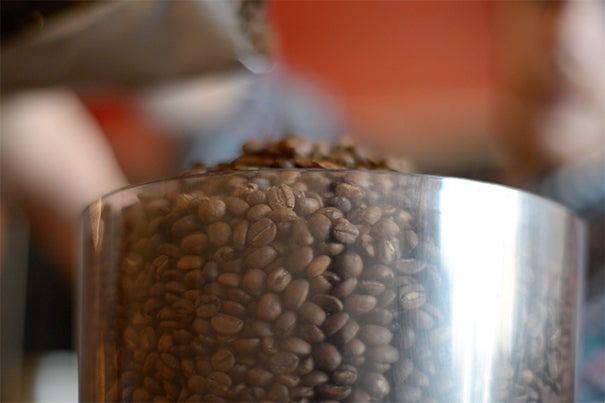
A new cohort study finds sugar does not negate the benefits of drinking coffee in moderation.
iStock by Getty Images
Health
Coffee is good for you, probably
Professor who edited mortality findings says evidence is strong but not yet definitive
Past research has linked coffee consumption to reduced mortality and suggested protective effects against diabetes and cancer. Now, a study published in the Annals of Internal Medicine says that adding a bit of sugar to your cup does not eliminate observed mortality effects, contrary to concerns that sweetener might negate the brew’s benefits. In fact, the study showed that those who drank 1.5 to 4.5 cups a day, even with a teaspoon of sugar, were up to 30 percent less likely to die during a seven-year period than non-coffee drinkers. The study was edited by Christina Wee, an associate professor at Harvard Medical School, who penned a companion editorial. She explained the findings in a conversation with the Gazette. The interview has been edited for clarity and length.
Q&A
Christina Wee
GAZETTE: Where we are with the science of coffee and its health benefits?
WEE: Generally speaking, coffee drinkers tend to have a substantially reduced risk of mortality compared to non-coffee drinkers. The main evidence to date is based largely on observational cohort studies, where you’re comparing coffee drinkers and non-coffee drinkers over time. There are also some smaller Mendelian randomization studies which, rather than measuring coffee drinking directly, look at genetic markers that are correlated with caffeine metabolism and are, in essence, markers of who might better tolerate coffee — and thus be more likely to consume coffee. They then look to see whether people with that genetic makeup — a proxy for greater likelihood to consume coffee — do better. Those studies have largely found no difference in mortality. However, those studies also have limitations. Mendelian randomization is a strong study design, in the sense that you don’t worry about confounding as much — whether coffee drinking is associated with some other health behavior that is really the reason for the better outcome. On the other hand, the genetic markers of coffee consumption are pretty weak proxies for actual coffee consumption. Even if you have a genetic marker for coffee tolerance and your likelihood of drinking coffee is higher, it may be only a little higher. It’s akin to assigning people to drink coffee in a randomized trial, but only a small percentage of those assigned to drink coffee actually drink it, so when you don’t find a difference you can’t be sure that it’s because coffee has no health effects or because not enough people in the coffee group did as they were told.
“If you’re not a coffee drinker and you don’t particularly like drinking coffee, I wouldn’t start drinking coffee because of the potential health benefits. That’s a leap.”
GAZETTE: Does that mean the jury’s still out?
WEE: The jury’s still out. But there are smaller physiology studies that suggest there are certain components of coffee that may be beneficial as well. Caffeine and chlorogenic acids, which are found in coffee, seem to have antioxidant effects and also inhibit platelet aggregation. Whenever we see an effect in observational studies, we first ask, “Is it biologically plausible?” In the case of coffee, there is evidence to suggest that there are substances that do appear to have some beneficial physiological effects that could lead to the reductions in mortality that we’re seeing. So all of this is supportive, but not definitive, evidence.
GAZETTE: One of the things I’ve heard over the years is that if you put a lot of cream and sugar in coffee, that might negate whatever benefit there may be. This study addressed that specific question, correct?
WEE: To some degree. They looked specifically at coffee drinking when you add sugar or artificial sweeteners compared to people who didn’t drink coffee: If you drink coffee and add a little sugar to it, is it still potentially beneficial or at least not harmful? And these researchers did find that moderate consumption of coffee with a bit of added sugar was still associated with a substantial reduction in mortality risk. They did not look at coffee with cream or milk added specifically. They also did not compare drinking coffee with sugar to drinking coffee without sugar head-to-head. So we can’t say whether drinking coffee with sugar is worse or better than drinking coffee without sugar because, statistically, they didn’t make that comparison. The only thing we can really conclude is that when you look at people who drink coffee and add a little bit of sugar, they still do a whole lot better than people who don’t drink coffee.
GAZETTE: Where does this leave us, if you were to sum up where we are with the science?
WEE: What we can be most confident about saying is that drinking moderate levels of coffee is likely not harmful. If you’re someone who drinks coffee on a regular basis, up to three cups a day, you’re probably fine. If you add a little bit of sugar, you’re probably fine. And this type of coffee drinking may even be beneficial. I find it hard, though, to recommend that people start drinking coffee when the evidence is not definitive. If you’re not a coffee drinker and you don’t particularly like drinking coffee, I wouldn’t start drinking coffee because of the potential health benefits. That’s a leap.
The harder question to answer is what to do if you’re a regular coffee drinker and like two to three teaspoons of sugar in your coffee and you’re drinking four cups a day. If we believe the data that drinking coffee with a teaspoon of sugar is potentially good for you, I don’t think adding a second teaspoon is going to make it harmful. But it’s a matter of degree, and once you get into drinking multiple cups of caramel macchiatos — that’s a different story. I would take a commonsense approach. Ask yourself, “How far off am I from that typical drinker in the study?” and then, based on that, “How likely is it that any of this applies to my behavior?”





